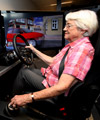November
Driving and Distracted

Trying to process complicated information while driving – such as taking work calls – significantly reduces our ability to drive safely, new research has shown.
Previous research has shown that drivers talking on hands-free have slower reactions than motorists who are just over the drink-drive limit.
Now transport experts from Newcastle University have shown the level of distraction depends on the intensity of the conversation and that trying to process complicated information, such as dealing with work-related calls, has the biggest impact on our reactions.
The work, carried out by researchers Alyxandra Petre and Dr Amy Guo, mapped response times against heart rate and eye-tracking data, speed maintenance and steering performance in the University’s DriveLab simulator.
Presenting their findings today at the launch of the BRAKE National Road Safety Week, the findings support new data released by the road safety charity that more than half a million UK drivers (575,000) have points on their licence for using their mobile phone at the wheel or being otherwise distracted.
Newcastle University researcher Dr Amy Guo, who presented the University’s research around driver behaviour at the ITS World Congress 2013 in Tokyo, explains: "We all know how hectic life can get - juggling family, work, deadlines, and other commitments means we are rushing around and constantly trying to multi-task.
"Add this to the fact that we can now be contacted anywhere, anytime because of mobile phones and the result is that many of us are trying to work on the road.
"It's a lethal combination. Driving does - and should - require 100pc concentration. As our results show, motorists cannot concentrate on the road if they are trying to make decisions or process complicated information."
What the research found
Previous work by the U.K's Transport Research Laboratory found that drivers talking on a hands-free set reacted more slowly than those who were just over the drink-driving limit and it has been estimated that up to a third of all road traffic accidents involve somebody who is at work at the time.
The research is part of a wider programme of work being carried out by the Newcastle team looking at driver behaviour and intelligent transport systems, including navigation systems to support older drivers and in-car communication technology to improve driver efficiency and safety.
Testing 50 volunteers, the team mapped driving responses for three levels of conversation: general chat, recalling a plotline and working out simple calculations or spellings. Each of these were done with a passenger, a hand held mobile device and a hands free set.
As expected, the team found the most significant distraction in all scenarios was caused when using a hand-held mobile phone.
But the team showed how intense conversations which required a higher level of processing – such as work-related calls – also led to a significant deterioration in driving behaviour even on hands free.
They found that when drivers were asked to think while on hands free, their speed maintenance and steering performance declined 37% compared to 25% when having the same conversation with a passenger.
This was the opposite to what most of the volunteers had expected, each one answering in the initial questionnaires they thought a passenger would be more distracting than a remote conversation on a hands free set.
Researcher Alyx Petre explains: “Previous studies suggest many people believe that speaking on a hands free kit is not unlike speaking to a passenger.
“However there are some key differences. A passenger - seated close to you inside the vehicle - also has the ability to see the traffic scenarios which the driver has to negotiate.
“This often results in the passenger reacting to the situations in a very similar way to that of the driver, for example, if the vehicle is approaching a busy roundabout, navigating a difficult junction or joining a motorway via a slip road, the passenger is likely to either suspend the conversation or not push for an answer until the driver is safe to give one.
“On a hands free device, the person on the other end of the call is not aware of any of this."
Watch the BBC's Sharon Barbour put the research to the test in our DriveLAB
Source Information: “Testing driver distraction from the use of both hands free and hand held mobile phones.” Alyxandra Grace Petre and Dr Amy Guo (project supervisor); and “Stay Active, Stay Safe: drivers’ perceptions of an Intelligent Speed Adaptation system.” Amy Guo, Phil Blythe, Dan Brennan, Katerina Pavkova. Presented at the ITS World Congress 2013, Tokyo.
published on: 18 November 2013
